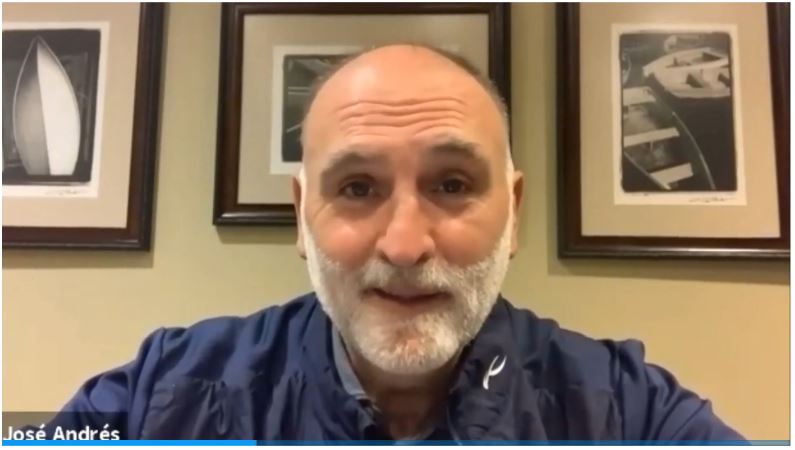This article is from the State of the Association and Keynote featuring José Andrés session during ISRI2021. If you would like to watch this session in its entirety, you can still register for ISRI2021 here. This session, along with others, are available to attendees on-demand.
José Andrés had an epiphany while reading a secondhand copy of The Virginia Housewife; Or, Methodical Cook, by Thomas Jefferson’s distant cousin, Mary Randolph. In the pages of what’s considered by culinary historians to be the first truly American cookbook, he found a recipe for Andalusian gazpacho — a popular dish in his native Spain. Chatting with ISRI Chair Gary Champlin, general manager of Champlin Tire Recycling Inc., during his ISRI2021 keynote speech on April 20, Andrés recalls, “This was the moment I said, ‘We are all much more connected than we think we are.’”
As keynote speaker on the virtual convention’s opening day, the international chef, restauranteur, television host, professor, and activist brought a cupboard full of stories to illustrate lessons he’s learned in 30-plus years of cooking for his family, restaurants, and World Central Kitchen (WCK), the nongovernmental organization he founded to bring healthy food to families and individuals touched by disasters.
WCK became a household name in the U.S. after Hurricane Maria struck Puerto Rico in September 2017. Andrés, working with volunteers and some employees from ThinkFoodGroup, his restaurant group, bested other relief organizations to deliver thousands of meals to people who would otherwise have gone hungry. During the initial COVID-19 pandemic wave in March 2020, WCK created Chefs for America, a meal program that partnered with institutions and nonprofits across the U.S. Restaurants for America. Chefs for America launched in mid-May and included more than 1,800 restaurants in over 200 cities. “Nothing in life is black and white,” Andrés says. “Life is like a rainbow after a storm. We need to open our eyes to the world that we live in and not be afraid. The vast majority of people are generous and giving.”
The owner of an international company with 31 locations, 1,200 employees, and $150 million in annual revenue, Andrés’ secret to success is being so passionate that he has no problem rolling up his sleeves and doing the heavy lifting himself. “Restaurants are a very important part of the DNA of who we are,” he says. “The word ‘restaurant’ comes from ‘restoration;’ it means not only to restore your body but to restore your soul.” Businesses that value and invest in their employees and communities will succeed most coming out of the worst of the pandemic, he notes.
“Overplanning will put your team on the path of failure,” he explains. “If we learned anything in 2020, it’s that life does not go according to plan.” He advises setting up work teams to make quick decisions in adversity. Another pro tip: Look for simple solutions to problems. Chat viewers can help the restaurant industry recover by giving gift cards and otherwise supporting local businesses, or donating “heart, brains, empathy,” like offering to help a mom-and-pop business balance its books or aiding in other practical tasks.
Andrés is betting big on 2021, opening two restaurants in New York City and four dining spots in Chicago. He said the current situation is similar to the aftermath of the 1918 influenza pandemic, the so-called “Spanish flu,” which disrupted life a century ago killing at least 50 million people worldwide and 675,000 in the U.S. Andrés noted the 1918 pandemic was followed by the Roaring Twenties, a decade of economic growth, technological strides, and mass consumerism. “If we learn from what happened in 1920 the economy will be good; the economy is going to do well. Success is if we can all do better going forward,” he said.
Andrés’ American Dream involves hard work; in his book, nothing is given, only earned. He arrived in New York in 1990 with less than $100. In 2013, he took his U.S. citizenship oath in Baltimore as a celebrity. He continues to advocate for the positive impact immigrants make in the U.S. “In the pandemic and beyond, they are often the ones working in the farms, the factories,” Andrés says. “We need to be sincere with that situation. This shouldn’t be about Republicans and Democrats; immigration shouldn’t be a problem for America to solve. Immigration is an opportunity for America to seize.”
Andrés learned about recycling opportunities as a young boy, watching his mother make croquetas, the Spanish relatives of croquettes. In a pan, she combined bits of chicken and vegetables, together with bechamel sauce (olive oil, butter, flour, and milk) and fried them to perfection. Likewise, Andrés gained a valuable lesson from stoking fires for his father’s paella, the traditional Spanish rice dish containing rice, meat, seafood, and vegetables slowly simmered in saffron and broth inside a wide, two-handled pan.
“Master your fire — control your fire — then you can control your life,” Andrés says.
Photo caption: Chef José Andrés describes his vision at ISRI2021. Photo courtesy of ISRI staff.
Additional Resources













